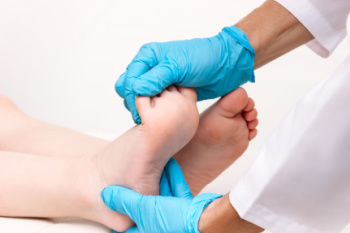 Lower limb and foot injuries are common in athletic children, partly due to the vulnerability of their growth plates. Growth plates are the developing areas of cartilage at the end of the long bones in the legs where bone growth takes place. These plates are weaker than nearby tendons and ligaments, making them more susceptible to injury. This is especially true when under the stress of repetitive physical activities in sports. Movements like running, jumping, and quick pivoting can place excessive strain on growth plates, leading to conditions such as Sever's disease, or heel pain. Ankle sprains are also common because ligaments in children tend to be more elastic than in adults. The biomechanics of growing children, such as variations in gait, muscle strength, and coordination during growth spurts, can further predispose them to these injuries as their bodies adapt to rapid physical changes. A podiatrist, or foot doctor, can treat these types of injuries common in active children. They may suggest treatments ranging from rest and elevation to custom orthotics that support proper alignment and reduce stress on the growth plates. Treatments vary depending on the injury. If your child is struggling with a lower limb or foot injury, it is suggested you consult with a podiatrist for targeted care.
Lower limb and foot injuries are common in athletic children, partly due to the vulnerability of their growth plates. Growth plates are the developing areas of cartilage at the end of the long bones in the legs where bone growth takes place. These plates are weaker than nearby tendons and ligaments, making them more susceptible to injury. This is especially true when under the stress of repetitive physical activities in sports. Movements like running, jumping, and quick pivoting can place excessive strain on growth plates, leading to conditions such as Sever's disease, or heel pain. Ankle sprains are also common because ligaments in children tend to be more elastic than in adults. The biomechanics of growing children, such as variations in gait, muscle strength, and coordination during growth spurts, can further predispose them to these injuries as their bodies adapt to rapid physical changes. A podiatrist, or foot doctor, can treat these types of injuries common in active children. They may suggest treatments ranging from rest and elevation to custom orthotics that support proper alignment and reduce stress on the growth plates. Treatments vary depending on the injury. If your child is struggling with a lower limb or foot injury, it is suggested you consult with a podiatrist for targeted care.
The health of a child’s feet is vital to their overall well-being. If you have any questions regarding foot health, contact one of our podiatrists of Advanced Foot Specialists. Our doctors can provide the care you need to keep you pain-free and on your feet.
Tips for Keeping Children's Feet Healthy
- Make sure their shoes fit properly
- Look for any signs of in-toeing or out-toeing
- Check to see if they have Clubfoot (condition that affects your child’s foot and ankle, twisting the heel and toes inward) which is one of the most common nonmajor birth defects.
- Lightly cover your baby’s feet (Tight covers may keep your baby from moving their feet freely, and could prevent normal development)
- Allow your toddler to go shoeless (Shoes can be restricting for a young child’s foot)
- Cut toenails straight across to avoid ingrown toenails
- Keep your child’s foot clean and dry
- Cover cuts and scrapes. Wash any scratches with soap and water and cover them with a bandage until they’ve healed.
If you have any questions, please feel free to contact our offices located in Rockwall, Greenville, Dallas, and Sachse, TX . We offer the newest diagnostic and treatment technologies for all your foot care needs.
